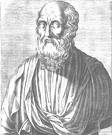
Local Economy: Lost In Translation
When I was an undergraduate at the University of Massachusetts, I wiggled into a two-semester Greek class at Smith College. Although I had to deal with occasional condescension from the bona fide Smithies, the hours I spent reading Plato in the original Greek are among the things I miss most about college. (Actually, there are a few other things I miss too.) It makes me sad that Greek and Latin are considered outdated and irrelevant; the classics have so much to teach us.
Case in point: “Local Economy” — The word economy comes from the Greek oikos which means home. Economy, at least etymologically, refers to household affairs, so the idea of a local economy is redundant. The idea of a global economy, on the other hand, is etymologically nonsensical unless you consider the Whole Earth your home. But maybe that’s the whole point. We don’t have a sense of our roots.
Ecology, I think, has the same root. Home.
(Disclaimer: There is a good argument that Plato was not, in fact, an Eco-Hunk because of his ideas about the disconnect between the spiritual and the material world. If I remember correctly, David Abram wrote a book called Spell of the Sensuous which talks about this. Stephan Harding’s Animate Earth deals with this briefly as well.






